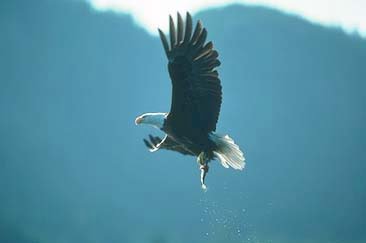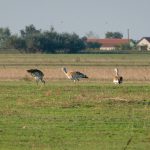U.S. Route 12 passes through Idaho and Montana as a two-lane undivided highway snaking along the Clearwater and Lochsa rivers, shaded by the trees and cliffs of two national forests. It takes tourists to hot springs and historic markers, bicyclists and motorcyclists on the ride of their lives, locals to the skiing and sport fishing that are key parts of the self-defined Rocky Mountain way of life. It also carries nature lovers into the land of the Bald and Golden Eagle, the Trumpeter Swan, the moose, and the grizzly.
If Big Oil has its way (and Big Oil is used to getting its way) it will soon carry Ozymandian refinery and drilling equipment to the tar sands of Alberta, where they will help bequeath us all a legacy of greenhouse gases, destroyed boreal forests, rare cancers, and increasing economic inequality. Standing against this future is a group of people who are saying, essentially, Not in My Back Yard — but with a new perspective that recognizes that all backyards are linked, hoping not to shield the privileged from the consequences of environmental destruction but to force delays to that destruction until it becomes too expensive for Exxon, Conoco and the rest to carry on. (For the tar sands are hardly efficient. According to information presented by the NRDC, Sierra Club, and Earthworks, it takes the energy equivalent of three barrels of oil to extract one barrel of usable oil from these tar sands – along with four barrels of water and the processing of four tons of earth.)
You can read about this battle in detail at AllAgainstTheHaul.org, but this is a bird blog, so I will talk specifically about birds.
Tar sands oil extraction in Canada is disastrous for the birds of the American hemisphere. First off, it involves the destruction of the boreal forest. You may have heard of the boreal forest before, in passing – it’s only so important that they named a chickadee after it. Some 300 species of birds, mainly songbirds and waterfowl, depend on the boreal forests for breeding habitat. Less forest, less birds. The Boreal Songbird Initiative, therefore, is firmly against tar sands development.
Besides habitat loss, these extraction projects kill birds directly. Remember the four barrels of water used to process each barrel of oil? 3.6 of those barrels are so severely polluted that even under the lax standards in place they can’t be returned to the rivers and streams they came from. Instead, they form tailing ponds. These sludge ponds look very much like regular ponds, but birds who land in them become oiled, exposed to toxic mining by-products, and they die. The oil industry, asked to self-report on the problem of bird deaths, has unsurprisingly been caught drastically underreporting the numbers of birds lost this way. Such incidental slaughter is disturbing enough when you consider the long-term consequences on a previously steady bird population, but when you consider that some of these ponds lie in the path of the last best population of migratory Whooping Cranes, it raises the blood pressure a little.
And, of course there’s the hauling of the equipment, the one tentacle of this monster that us Interior Westies are in a position to hack off directly. While bird deaths from truck strikes are a fairly minor cause of mortality (although hardly a non-factor, as anyone who has ever spent much time watching a population of screech owls can tell you) these monster trucks will degrade the rivers and streams they travel along, both due to the necessary construction and repair to the roads caused by outsize weights, and due to the inevitability of accidents that will lead to the trucks themselves winding up in the drink. Degraded rivers and streams = less fish = less food for diving ducks, eagles, Ospreys. Moreover, this project involves the “port” of Lewiston, artificially created by the damming of the Snake River. The Snake River dams, which have 9-times-over decimated the salmon run on that river, were looking fair to be removed as an economic boondoggle before this shipping project was proposed. Now they may stick around until the salmon are gone for good — disastrous for wildlife that depends on them both inland and at sea.
All Against The Haul provides a list of officials to contact and petitions to sign, as the spirit moves. And, as always, please think of one or two ways to use less gas.
Photo courtesy of the U.S. Fish and Wildlife Service.












Another reason to monitor each political move of Caribou Barbie now and especially in 2012.
Regarding the oil sands, I am rather pessimistic. Considering how valuable oil is, not only to be burnt in vehicles but especially for pharmaceutic and organic chemisty (there is scarcely any synthetic material that is not based on crude oil), it seems unrealistic to presume the Alberta oil sand will remain untouched. Nature conservation probably should start to develop conservation strategies for the boreal zone that incorporate the complete mining of the oil sands, just to be sure. Having said that, the current method of mining the sands and extracting the oil are much too bad to tolerate, so any action that makes the oil sands economically less attractive for the time being are extremely valuable. The only hope is to interrupt or slow down the mining until environmentally less harmful ways are – hopefully – found.
And I find it charming that you already call yourself an “Interior Westy”.
@Jochen – I do agree with you that the oil will come out eventually, assuming that our present economic and social system doesn’t suffer some major unforeseen swerve in the near future. But the technology in place now is just unacceptable, and the regulation surrounding it is far too lax. Any delay we can achieve buys time to fix those problems, as you say.
And if we can make it unappealing to ship via the Port of Lewiston and perhaps even convince Exxon/Conoco/etc. that it would be preferable to manufacture the equipment closer to where it’s going to be used (I’m thinking Detroit might have some space and workers free) that would be a victory in and of itself.
On a related note, an update on the second test load is here. I’d say that Mother Nature is helping us out, but in reality it was just sheer stupidity to think they’d get through without weather delays in February, especially in a La Nina season.